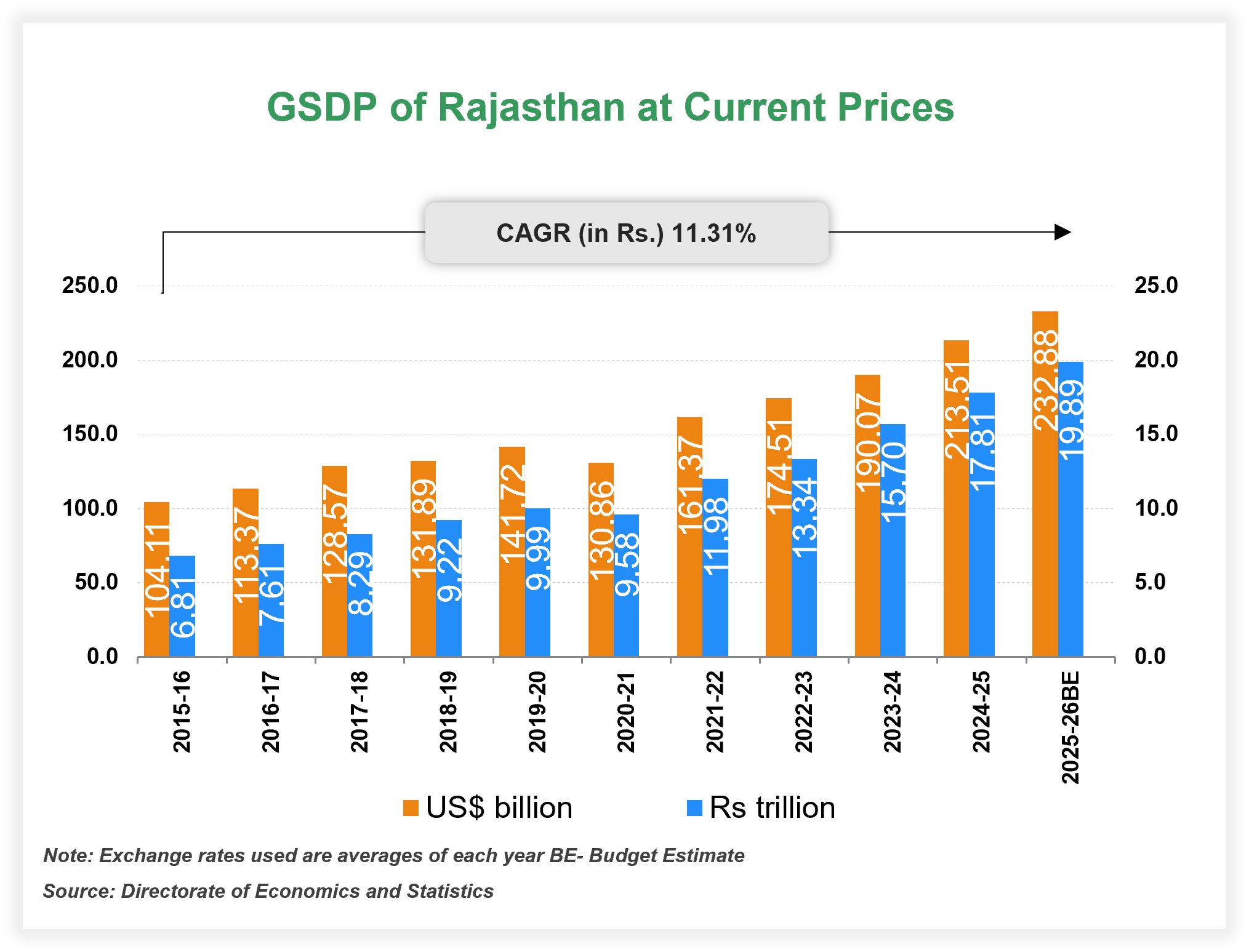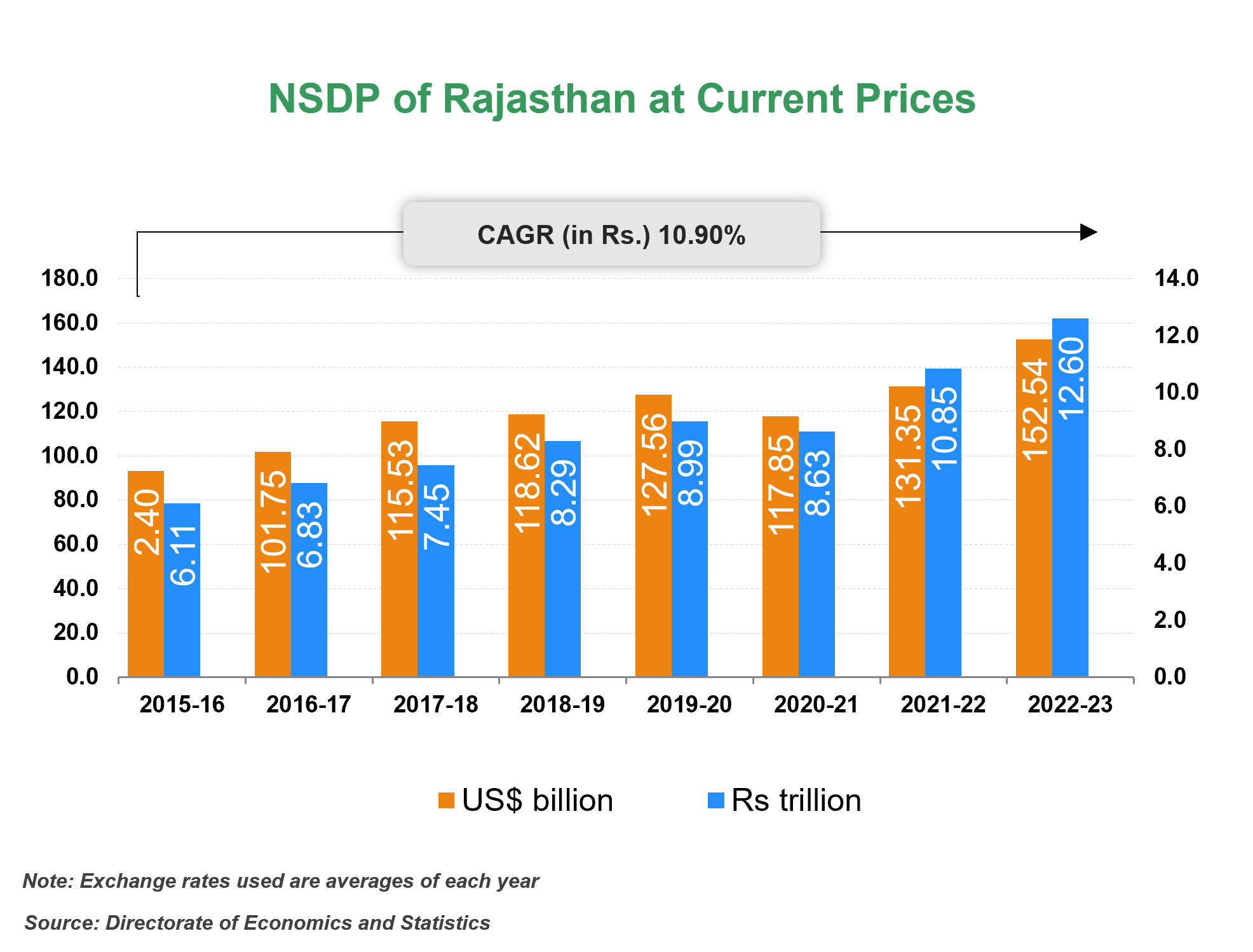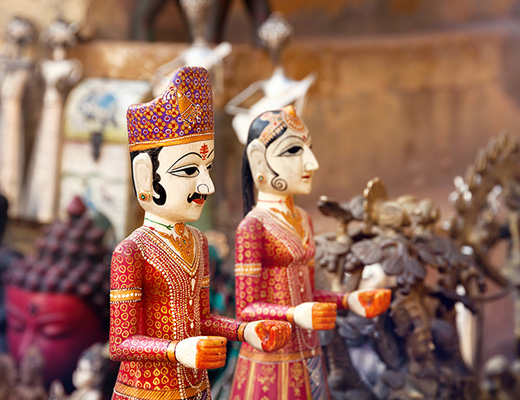Rajasthan
Rajasthan ranks first in India in the production of oilseeds, rapeseed, and mustard and is the second largest producer of garlic, nutri-coarse cereals, coriander, and cumin.


Introduction

Rajasthan, the largest (area-wise) state in India, is in the northwest part of the subcontinent. It is surrounded on the north and the northeast by Punjab, Haryana, and Uttar Pradesh, on the east and southeast by Uttar Pradesh and Madhya Pradesh, and on the southwest by Gujarat.
It is among the largest mineral-producing states in India. Around 81 varieties of minerals are available in the state, and 57 minerals are produced on a commercial scale in the state. It also contributes significantly to the production of dimensional and decorative stones, such as marble, sandstone, granite etc.
At current prices, Rajasthan’s GSDP is projected to be Rs. 19,89,000 crore (US$ 232.88 billion) in FY26. Between FY16 and FY26, the state’s GSDP increased at a CAGR (in Rs.) of 11.31%.
The growth was driven by storage, communication & services related to broadcasting, financial services and public administration. According to the Department for Promotion of Industry and Internal Trade (DPIIT), foreign direct investment (FDI) inflows in the state stood at Rs. 28,688 crore (US$ 3,267 million) between April 2000-June 2025.
Rajasthan Tourism
Tourism is a key driver of Rajasthan’s economy, supporting employment across hospitality, transport, handicrafts, and cultural sectors, and contributing significantly to the State’s GDP. In CY24, the State recorded 2,321.56 lakh visitors, including 20.72 lakh foreign tourists, with Jaipur, Udaipur, Jodhpur, Jaisalmer, and Ajmer being major attractions.
Rajasthan operates luxury trains such as the Palace on Wheels and Royal Rajasthan on Wheels, linking key destinations across states. Investment opportunities span heritage cities, wildlife sanctuaries like Sariska and Ranthambore, and desert landscapes in Jodhpur and Jaisalmer.
The Rajasthan Tourism Unit Policy (RTUP) 2024 aims to attract private investment and promote entrepreneurship. By December 2024, 259 projects worth Rs. 3,599 crore (US$ 410 million) had been approved, expected to generate around 12,000 jobs. Skill development through the Rajasthan Institute of Tourism and Travel Management (RITTMAN), along with marketing initiatives like the Great Indian Travel Bazaar (GITB) and Rajasthan Domestic Travel Mart (RDTM), further strengthen the sector. The Tourist Assistance Force ensures visitor safety and enhances Rajasthan’s reputation as a welcoming
Agriculture in Rajasthan
Agriculture and allied sectors form the foundation of Rajasthan’s economy, accounting for 26.92% of the State’s Gross State Value Added (GSVA) in FY25. Benefiting from its varied climatic conditions, the State produces a diverse range of crops. The sector has witnessed consistent growth over the years, with GSVA rising from Rs. 1,19,000 crore (US$ 13.56 billion) in 2011-12 to Rs. 4,23,000 crore (US$ 48.19 billion) in 2024-25 at current prices.
The state has an agricultural economy with nine agro-climatic zones and various types of soil that help during the cultivation of crops. As part of the state budget 2023-24, Fasal Beema Yojana has been allocated Rs. 1,400 crore (US$ 167.93 million). In August 2022, Mr. Narendra Singh Tomar, Minister of Agriculture and Farmers Welfare inaugurated four new facilities at the Central Arid Zone Research Institute (CAZRI), which has been rendering excellent services for more than 60 years under the Indian Council of Agricultural Research (ICAR).
Industries in Rajasthan
The state is the leading producer of cement-grade limestone in India. Production of limestone stood at 79,236 thousand tonnes in 2023-24. The state has about 26% share in proven limestone reserves in the country^ and contributes 23% to India’s total limestone production. In May 2024, JSW Cement announced to invest Rs. 3,000 crore (US$ 359.84 million) crore on building an integrated manufacturing facility at Nagaur in Rajasthan. Shree Cement, the second largest cement-maker in India, in December 2023, commissioned a new klin at its integrated production facility in Nawalgarh, Rajasthan. The plant, set up at Rs. 3,500 crore (US$ 419.82 million) can produce 3.5 million tonnes of cement per annum.
Recent Developments in Key Sectors
- On October 23, 2025, the Union Cabinet approved the development of a new airport at Kota-Bundi in Rajasthan with an investment of Rs. 9,814 crore (US$ 1.12 billion). The project aims to enhance air connectivity in southern Rajasthan and support the region’s growing industrial, educational, and tourism sectors.
- On October 24, 2025, the Indian Railways launched three new train services in Rajasthan, including two Vande Bharat Express routes, the Jaipur-Udaipur Vande Bharat Express and the Jaipur-Jodhpur Vande Bharat Express along with the Jaipur-Kota Intercity Express, to strengthen connectivity and promote tourism across the state.
- On August 25, 2025, NBCC Ltd received an Rs. 3,700 crore (US$ 421.6 million) contract from the Rajasthan Government to develop a 95-acre mixed-use project in Jaipur featuring a convention centre, IT and GCC towers, hotels, and residential facilities.
- As of August 2025, Rajasthan had a total installed power generation capacity of 56,494 MW, of which 9,040 MW was under the central utilities 8,890 MW under state utilities and 38,562 MW under the private sector.
- On June 3, 2025, Larsen & Toubro Ltd (L&T) secured significant water-infrastructure contracts valued between Rs. 1,000-2,500 crore (US$ 113-284 million) from the Government of Rajasthan, covering rural water-supply, fluorosis-mitigation and system-strengthening works.
- As of June 2025, Rajasthan had 65 million wireless and 1.14 million wireline subscribers.
- On May 22, 2025, Prime Minister Mr. Narendra Modi inaugurated 103 redeveloped railway stations across 18 states and Union Territories under the Amrit Bharat Station Scheme and unveiled development projects worth Rs. 26,000 crore (US$ 2.95 billion) in Rajasthan, including new rail lines, electrification works, solar power projects, and national highway upgrades aimed at boosting connectivity and regional growth.
- Union Minister for Road Transport & Highways, Mr. Nitin Gadkari approved a Rs. 1,237 crore (US$ 140.5 million) project to build a 134.86 km two-lane highway in Rajasthan’s Jaisalmer and Barmer districts, boosting connectivity, border security, and regional development.
- Total merchandise exports from Rajasthan stood at Rs. 33,976 crore (US$ 3.86 billion) in FY26 (April-July 2025). Gems and Jewellery and Engineering Goods accounted for a majority share in the overall exports from the state.
- Under state budget FY26
- Rs. 14,016 crore (US$ 1.64 billion) has been allocated for capital outlay on roads and bridges.
- Rs. 22,819 crore (US$ 2.67 billion) has been allocated as grants for non-revision of electricity tariffs.
- Rs. 3,592 crore (US$ 420.6 million) has been allocated as assistance to urban development authorities and town development boards.
- Rs. 29,363 crore (US$ 3.4 billion) has been allocated for primary education.
- Rs. 33,792 crore (US$ 3.96 billion) has been allocated for secondary education.
- Rs. 4,336 crore (US$ 507.7 million) has been allocated towards urban health services -allopathy.
- Rs. 3,586 crore (US$ 419.9 million) has been allocated towards rural health services -allopathy.
- Rs. 6,609 crore (US$ 774.8 million) has been allocated for crop husbandry and Rs. 3,618 crore (US$ 424.2 million) for animal husbandry.
- On July 12, 2024, the Rajasthan government allocated substantial funds in its 2024-25 budget for water supply projects, including Rs. 15,000 crore (US$ 1.80 billion) for tap connections in 2.5 million villages and Rs. 20,370 crore (US$ 2.44 billion) for six major drinking water projects under the Jal Jeevan Mission.
- On September 3, 2024, the Rajasthan government announced plans to develop 14 new industrial areas as part of its strategy to enhance the manufacturing sector, which contributes about 24% to the state's gross state domestic product. This initiative is aimed at ensuring the success of the upcoming investment summit, 'Rising Rajasthan,' scheduled for December in Jaipur.
- Under the state budget 2023-24, as part of the Chief Minister’s Free Electricity Scheme, 100 units of free electricity will be provided, up from 50 units earlier.
- As part of the state budget 2023-24, Rs. 4,122 crore (US$ 494.42 million) has been allocated for grants in aid to Nagar Palika.
Note: ^Excluding Fuel, Atomic and Minor Minerals




